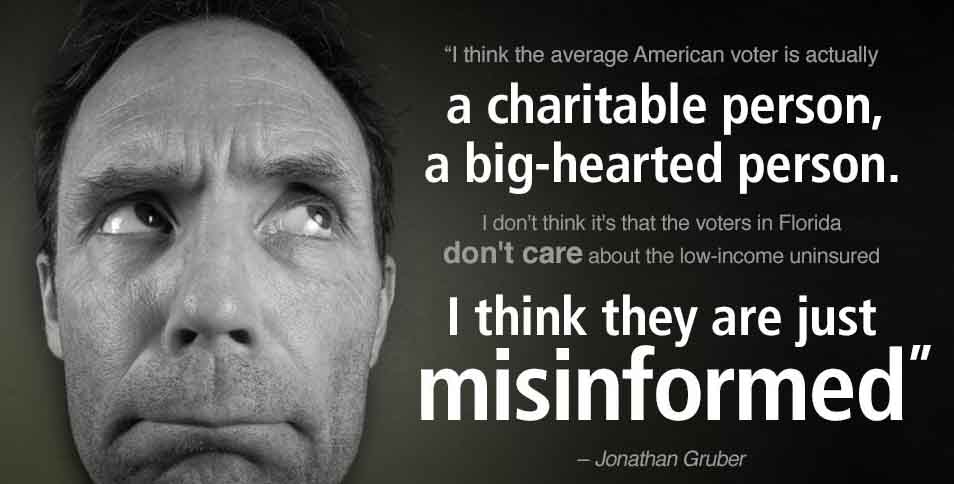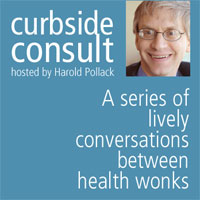
EDITOR’S NOTE: Healthinsurance.org’s Curbside Consult is a periodic informal dialogue with medical and health policy experts about pressing issues of the day.
For this edition, I Skyped last week with Dr. Jonathan Gruber, the Ford Professor of Economics at the Massachusetts Institute of Technology and director of the health care program at the National Bureau of Economic Research. He is also the most famous health economist in the United States. He has won numerous awards, and written countless papers and academic articles. He has even written a graphic novel about health reform.
 Gruber was a key designer and analyst of the Massachusetts’ health reform that came to be known as Romneycare. He later performed some of the same analyses for the Affordable Care Act.
Gruber was a key designer and analyst of the Massachusetts’ health reform that came to be known as Romneycare. He later performed some of the same analyses for the Affordable Care Act.
In Part 1 of our interview Gruber told us he was “feeling pretty good” about the Affordable Care Act. We talked about the improved online experience, measurements of the insured and uninsured, and the tragedy of the failure of many states to expand Medicaid coverage.
In Part 2, we get under the hood with some of the political mechanics of ACA. What are the likely political problems now that the basic enrollment targets are being met? What are some possible legislative fixes to make health reform better? Can anything be done to improve Medicaid’s low reimbursement rates to medical providers? Will Democrats actually campaign on ACA’s successes? (Spoiler alert: They probably won’t)…..
I hope you enjoy the conversation.
Transcript of this interview:
Harold: Absolutely. This is healthinsurance.org, Curbside Consult. This is Harold Pollack talking to Jon Gruber. By the way, I’ll give another mea culpa, which is I got called by PolitiFact about Florida. Governor Crist said that they are killing six people a day by not expanding Medicaid, and I sort of looked at the data and I said, “Well, that’s probably in the high end of a speculative estimate.” PolitiFact sort of gave him a Half-True for that.
What I really should have said is, “They are actually probably only killing three people a day.” I blew the opportunity to clarify because that’s actually what … it turns out if you run the numbers that’s closer to what he should have said.
Jon: Right.
Time for legislative fixes?
Harold: But it is amazing. Let me ask you a couple of things about the substance of the law. Now that we have sort of seen it in operation, there is this whole political fight going on that we have been talking about. Are we seeing some things that we should be changing in the way the law was written or the way it is operating? Should we have an opportunity to make some legislative fixes that we might want to go do?
Jon: Let’s separate the substance from the politics. Substantively, I don’t think we know enough yet that we should change anything. I don’t see … There are things I would change that I would have changed a year ago. For example, I think that the cautionary protections for people in the, not the poor few, people in the low income, 150 to 300 percent of poverty, they are going to face some pretty high costs relative to their income.
That’s something I wrote about a couple of years ago in a brief for the Commonwealth Fund. That I fixed, but there’s really nothing we have learned, in the past six months of substance that should impact the law. We have learned a lot about political problems we didn’t do a good enough job anticipating, but I don’t think there was anything of substance that’s wrong with the law in the last six months.
Harold: Are there some political problems that we haven’t talked about that we should just mention?
Jon: I think the big thing is the employer mandate. The employer mandate represents, I don’t know, something like a tenth of the revenue of this law, and it represents maybe 3 percent of the benefits in terms of covering people, but it’s causing maybe 90 percent of the political headaches.
Harold: Yeah.
Jon: You’ve got to seriously ask yourself if that’s worth the political cost. If you’ve got rid of the employer mandate, you have fewer than a million more uninsured people. Now, that’s a lot of people, that’s a shame. You’d lose a lot of money, so you’d have to make that up, but, boy, that would get rid of a lot of political problems. I think it’s something that politicians have to think seriously about because I think that it’s just not clear it’s worth the political headaches it’s getting.
Will Dems run on … or from … the ACA?
Harold: By the way, do you think that Democrats are going to start running on defending the ACA between now and the mid-term elections, given that it’s going a little better?
Jon: I think selectively. It’s just, the thing about the ACA, this is probably the number one thing, is just politically to, it’s just the heterogeneity across states. It’s going so differently in different states. It’s perceived differently in different states. I think I can see California people running on it. I can’t imagine Louisiana people running on it.
Harold: Or Kentucky ironically, even though it’s such a big success there.
Jon: Yeah. Yeah, that’s right. I think that there will be just a lot of heterogeneity around the country.
The 900-pound Medicaid gorilla
Harold: One think I wanted to ask about states like Kentucky that are implementing the Medicaid expansion, they have reduced the number of uninsured by something like 42 percent in the state, which is amazing. Also, Medicaid is effectively becoming the 900-pound gorilla in the health insurance market in Kentucky. Something like one-third of the non-elderly population is going to be covered by Medicaid or related programs. How do you think that’s going to change the nature of Medicaid as it takes on such a large swath of the population?
Jon: I think that’s a great question and I think the big issue is going to be: Can Medicaid continue to pay its doctors so poorly as it’s covering a larger and larger share of the population. Part of the reason Medicaid is cheap is because it pays doctors so poorly. Can that continue when it’s covering a third of the population? I’m not entirely sure that’s possible.
I think there’s going to be some real dynamics. There’s actually some good research, which suggests that if you pay doctors more under Medicaid, it improves health outcomes. So it wouldn’t be the end of the world if we paid Medicaid doctors a bit more, especially for primary care and obstetrics.
Harold: By the way, one of the things that drives me crazy is Republicans have discovered that people on Medicaid can’t always get the doctors that they want to see and that Medicaid isn’t a perfect program. Someone who is taking care of someone on Medicaid for almost 10 years now, I feel like women do when they are being mansplained to about, when a man is explaining menstrual cramps or something like that, like, “You mean that I can’t …”
Sometimes people are rude to me when I call up and I say I have a Medicaid patient who needs an appointment. What’s striking is that all of the critiques that Paul Ryan and others are making of Medicaid, when you look at their actual policy proposals, every one of them would make those features of Medicaid worse.
If we block granted Medicaid, that’s the single worst thing we could do in terms of encouraging states to raise provider rates and, in general, with these other problems that are essentially related to the incentive to underfund aspects of Medicaid, or to try to underpay for things.
Explaining better
Jon: The fundamental challenge, Harold, that liberals face politically is explaining to the American voter the cost of those types of policies. I think the average American voter is actually a charitable person, a big-hearted person. I don’t think it’s that the voters in Florida don’t care about the low-income uninsured. I think they are just misinformed.
I really believe that if we could politically help explain the costs to society of cutting provider rates, of cutting back Medicaid, I think we’d get the majority of people to support strengthening that program. I think it’s just because of racial reasons and other things, we just haven’t managed to get through with that message.
Primary care issues
Harold: This is healthinsurance.org, Curbside Consult. This is Harold Pollack talking with Jon Gruber. I should, by the way, just to close this part of the conversation off … We have this primary care provider challenge, and it certainly existed basically independent of ACA, but it’s going to be aggravated as we bring in more people into the system. What are some things that we can do in policy to try to lessen the shortage of primary care options for people?
Jon: I think, first of all, let me emphasize the point you made because, that people say, “Oh, we are going to have this primary care crisis because of the ACA.” Well, that’s not true. I think the facts of Massachusetts perfectly summarize it, which is the average waiting time for a family doctor went from 47 days to 51 days because of our healthcare reform.
There’s two ways you can look at that. One, you could say, “Wow. Four days. That’s a big increase.” The other thing you could say, “Forty seven days. That’s outrageous.” That summarizes the point, that yes, it’ll get a bit worse, but it’s already a problem. By the way, that’s my bird you’re hearing in the back with the whistle. You’re hearing the whistling and then cheeping, that’s the bird.
Harold: This is where you tell me your bird is named John Maynard Keynes or something like that.
Jon: No. No. Jomo.
Harold: Jomo. Okay.
‘De-skilling’ of care delivery
Jon: So what can we do about it? I actually think there’s really sort of fundamentally two things. The longer-run issue is to change the relative reimbursement of primary care and specialty care in the U.S., that basically primary care doctors are underpaid, specialists are overpaid. That needs to be addressed and I think as we move away from a free-for-service system towards a value-based system, I think that will be addressed.
In the near term, I think the real focus should be on scope of practice and expanding the scope of practice of non-physicians to provide primary care, pharmacists, physician’s assistants, registered nurses. There’s still doctors in America taking blood pressure, and there’s doctors in America entering data. There’s doctors in America doing things you don’t need a doctor’s degree to do. I think that basically we need to really be sort of de-skilling the delivery of medical care and sort of getting all the stuff that doctors don’t need to do out of their hands, so they can spend more time actually seeing the patients.
Harold: By the way, I would add the dental profession to that as well.
Jon: Yeah.
Harold: One of the most disappointing aspects of ACA to me is the failure to address dental care, which is just kind of literally a bridge too far. Dentists really have not wanted to treat the Medicaid population, but they also have resisted efforts to have other types of professionals treat the Medicaid population at the same time. It’s just every severely poor person basically that I’ve ever met, if they just open their mouth, you see, their teeth are falling out. Dental hygienists, there’s any number of things that we could do that would, in a cost effective way provide basic dental care to people.
Jon: I totally agree.
Harold: The political economy of the dental profession as in the medical profession makes that …
Jon: Hard. Yeah.
Harold: Makes that very hard.
One of the interesting things about health reform is that there’s this ideological battle and then there’s these series of interest group politics battles that are, and there is a big incentive for the various interest groups to glom on to the ideological cleavages as a way to avoid confronting changes that need to be made.
So if you start debating, competitive bidding for wheelchairs in Medicare, there’s a big incentive for the various interest groups to somehow try to tie that to the liberal-conservative fight over the rest of ACA and it really is a totally independent issue.
Jon: Right.
Harold: I suspect that George W. Bush’s Medicare people and Obama’s Medicare people have much more in common with each other than either one with the congressional committee chair.
Jon: Yes. I agree.
Watch Part 1: Reports of ACA demise: greatly exaggerated
Watch Part 3: Will there be an ‘exodus’ to the exchanges?
Harold Pollack is the Helen Ross Professor at the School of Social Service Administration. He is also Co-Director of The University of Chicago Crime Lab. He has published widely at the interface between poverty policy and public health. Pollack serves as a Fellow at the MacLean Center for Clinical Ethics at the University of Chicago, and as an Adjunct Fellow at the Century Foundation.

Get your free quote now through licensed agency partners!







